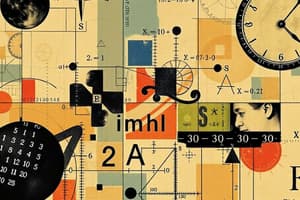Podcast
Questions and Answers
What do variables represent in an equation?
What do variables represent in an equation?
- Fractions
- Unknown quantities (correct)
- Known quantities
- Constants
Which property of operations states that changing the order of terms in addition does not affect the sum?
Which property of operations states that changing the order of terms in addition does not affect the sum?
- Identity property
- Distributive property
- Associative property
- Commutative property (correct)
What type of equations can be written in the form of $ax + b = c$?
What type of equations can be written in the form of $ax + b = c$?
- Quadratic equations
- Complex equations
- Linear equations (correct)
- Exponential equations
Which algebraic topic involves equations with higher powers, fractions, and roots?
Which algebraic topic involves equations with higher powers, fractions, and roots?
How do algebra and arithmetic contribute to a strong mathematical foundation?
How do algebra and arithmetic contribute to a strong mathematical foundation?
Which concept is essential for success in more advanced math courses and STEM fields?
Which concept is essential for success in more advanced math courses and STEM fields?
What is the foundational discipline that deals with addition, subtraction, multiplication, and division for whole numbers, decimals, and fractions?
What is the foundational discipline that deals with addition, subtraction, multiplication, and division for whole numbers, decimals, and fractions?
Which operation involves repeated addition?
Which operation involves repeated addition?
What mathematical concept involves finding relationships between variables using symbols and rules of operations?
What mathematical concept involves finding relationships between variables using symbols and rules of operations?
Which operation involves combining two or more numbers to produce a single result?
Which operation involves combining two or more numbers to produce a single result?
Which branch of math serves as the foundation for higher mathematical skills?
Which branch of math serves as the foundation for higher mathematical skills?
What type of number is represented by a decimal point?
What type of number is represented by a decimal point?
Flashcards are hidden until you start studying
Study Notes
Math: Exploring Arithmetic and Algebra
Math encompasses a vast and interconnected world of concepts, techniques, and problem-solving methods. To better understand this foundational discipline, let's delve deeper into two fundamental subtopics: Arithmetic and Algebra.
Arithmetic
Arithmetic, often referred to as number sense or number operations, deals with the basic operations of addition, subtraction, multiplication, and division for whole numbers, decimals, and fractions. It serves as the foundation on which higher mathematical skills are built.
Addition and Subtraction: These operations involve combining or separating quantities. Addition is the process of combining two or more numbers to produce a single result, while subtraction involves removing one number from another.
Multiplication and Division: These operations are focused on finding the products and quotients of numbers. Multiplication involves repeated addition, while division involves finding how many times one number can be added to produce another number.
Decimals and Fractions: Arithmetic operations are extended to include decimals (numbers with a decimal point) and fractions (parts of a whole number). Both decimals and fractions are written in a specific format to represent quantities that are smaller than an entire unit.
Algebra
Algebra, often considered the language of math, deals with solving equations and finding relationships between variables using symbols and rules of operations. It extends the concepts of arithmetic to enable the analysis, modeling, and solving of real-world problems.
Variables: These are placeholders for unknown quantities in an equation. Variables can take on any value that satisfies the equation, making algebra a powerful tool for solving problems and understanding relationships.
Properties of Operations: Algebra capitalizes on these properties to simplify and manipulate expressions. For example, the commutative property of addition states that changing the order of terms does not affect the sum, while the distributive property states that multiplying a sum or difference of two terms is equivalent to multiplying each term separately and adding the results.
Linear Equations: These are equations that can be written in the form of (ax + b = c), where (a), (b), and (c) are constants and (x) is the variable. Solving linear equations to find the value of (x) is a fundamental algebraic skill.
More Complex Equations: Algebraic expressions and equations become more complex with higher powers ((x^2), (x^3), etc.), fractions, and roots ((\sqrt{x}), (x^{1/2}), etc.). These advanced topics involve more sophisticated techniques for solving equations and analyzing relationships.
Both Arithmetic and Algebra are essential for developing strong mathematical foundations. The concepts and skills covered in these subtopics are fundamental to success in more advanced math courses, careers in STEM fields, and daily life. As we continue to explore math, we discover how these foundational concepts are interconnected and interdependent, forming a rich and fascinating discipline.
Studying That Suits You
Use AI to generate personalized quizzes and flashcards to suit your learning preferences.




